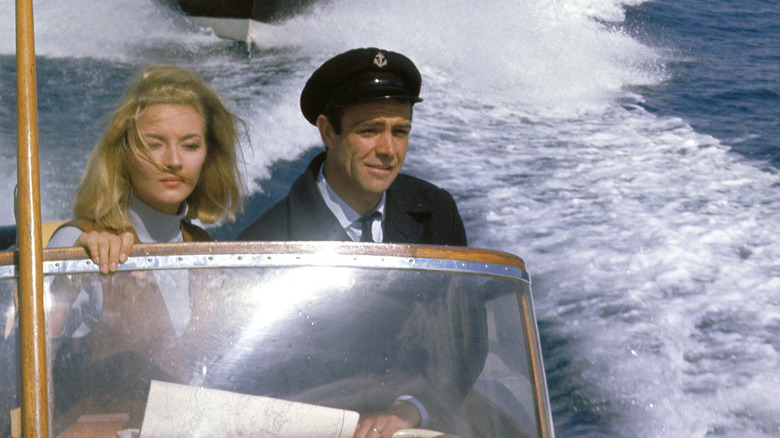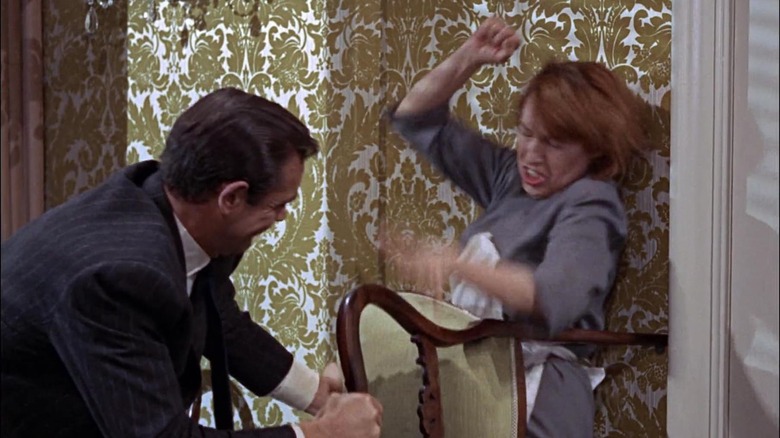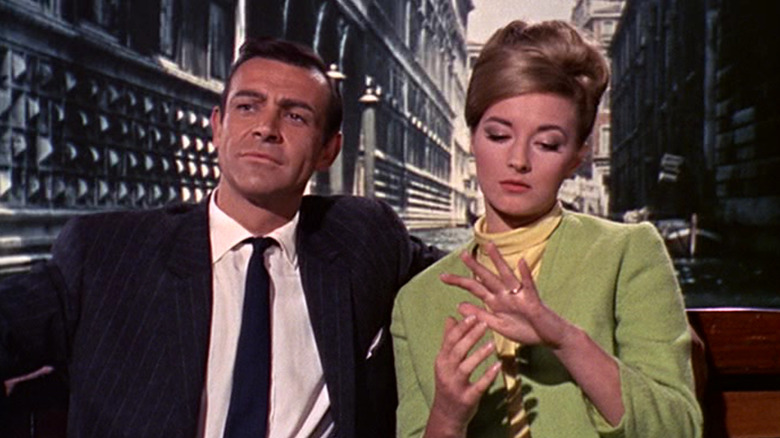From Russia With Love Went Off Script To Rescue One Of Its Best Scenes
Terence Young's 1963 triumph "From Russia with Love" was the James Bond series' first sequel, and, 60 years later, it's still considered by many 007 aficionados to be one of franchise's finest installments. It's a brisk, surprisingly brutal film. The gadgetry popularized by 1964's "Goldfinger" (and launched well over the top by 1965's "Thunderball") is kept to a sensible minimum (i.e., in a briefcase); for the most part, this is a revenge film in which our licensed-to-kill protagonist is lured into an elaborate defection plot designed to knock him off for having killed SPECTRE's Dr. No in the first movie. Narratively, it's as small potatoes as the mostly maligned "Casino Royale" follow-up "Quantum of Solace" (a revenge film in the other direction), but, at the time, it had the advantage of working within an unformed universe.
"From Russia with Love" has two of the Bond series' oddest highlights: the sexualized Turkish settlement brawl between Martine Beswick and Aliza Gur, and the messy train compartment fight to the death between Sean Connery and Robert Shaw. The roughly staged latter sequence suggests Young was able to literally roll with the punches and improvise within the tight space (while letting his actors take some serious lumps). But when it came to shooting the film's last action beat, in which Daniela Bianchi guns down Lotte Lenya, the latter of whom is lunging a poison-tipped stiletto hidden in her shoe, Young benefitted from having a writer in the room.
'Cubby, for God's sake, there's a gun lying there on the floor'
According to Edward Gross and Mark A. Altman's "Nobody Does It Better: The Complete, Uncensored, Unauthorized Oral History of James Bond," screenwriter Richard Maibaum was on set when they filmed SPECTRE agent Rosa Klebb (Lotte Lenya) trying to kick her lethal blade into Bond's flesh. Klebb pulls a pistol and ushers Daniela Bianchi's Tatiana Romanova out of the hotel room. For a moment, it appears Bond is finished — Klebb can plug the unarmed agent at close range. Then Tatiana pops back through the door and knocks the gun out of Klebb's hand. Now it's a free-for-all. The only problem was that Terence Young was hidebound to staging the scene the way it played out in Ian Fleming's novel.
Per Maibaum:
"The way Fleming had it, actually, Bond kicked back and deflected the poison thing in her shoe into Rosa Klebb's ankle, and she died. They tried to film it, but they couldn't get it. I was standing there with [producer Albert 'Cubby' Broccoli] on the set, watching them shoot the scene. I said to him, 'Cubby, for God's sake, there's a gun lying there on the floor. Have the girl pick it up and shoot her.' He looked at me, walked up to Terence, and eventually Terence said, 'Okay, let's do it.' But not until that moment was that created. Which shows why sometimes a writer should be on the set."
Maybe we need to bring Bond back to something recognizing Earth
Richard Maibaum's resourcefulness was well rewarded. He wrote "Dr. No" and "From Russia with Love," and received credit on 11 more 007 adventures, including the franchise's high-water mark, "On Her Majesty's Secret Service," and ending with 1989's underrated "License to Kill." His cleverness was dearly missed during the Pierce Brosnan era, during which Bond was transformed into a charmless 1990s action hero (working against the strengths of its hyper-charismatic lead).
But that's how it goes with 007. He must adapt not only to the tenor of the political times, but also moviegoers' appetites. Maibaum was certainly complicit in driving the character toward goofball action extravaganzas by writing the massive "The Spy Who Loved Me" and the irredeemably silly "A View to a Kill," and, as a die-hard Bond fan, those movies have a place in my heart. Still, I wonder what might've happened had Maibaum and the Broccolis stuck to Fleming's more grounded novels, where you could tidily wrap up a story in a hotel room rather than an underwater base so gargantuan Stanley Kubrick had to help light it.


